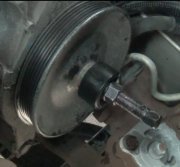Now I have to defer to my ten years experience working for a very nice family-owned Chrysler dealership, but I suspect other manufacturers follow similar procedures. In our case, the dealer is going to do everything possible to help you because they want your repeat business and they understand word-of-mouth advertising is very important. My boss' quote was "it takes more advertising dollars to get one new customer than it takes to keep ten current customers happy".
They would prefer that the manufacturer pay for the repairs because as long as they follow proper procedures as outlined in the warranty agreement or recall notice, there is no argument over cost of parts, what is repaired, etc. They just fill out the paperwork, and wait to get paid.
When there is something that results in the warranty or recall not being in force, there are other options before you are required to pay. First, you can request a meeting with the district representative. The dealer will set up the appointment for you and will often inform you of that option when you aren't aware of it. The district rep. Comes to town once per month for things like this and just to spend a day with the dealer. There are things the dealer can't do, as in give away the manufacturer's repair dollars and parts, and they are bound to follow the manufacturer's rules and procedures to maintain their franchise agreement. The district rep. Is not bound by franchise rules. My rep. Told me he could warranty anything and even offered to warranty the battery in my '93 Dynasty. I thanked him but refused as there was no defect with it. The car today has only 4,500 miles so it was lack of driving that allowed the battery to go bad.
In this meeting, the dealer's representative is your advocate and the district rep. Is the manufacturer's representative. You get to state your case, and whether you followed all the recommended service intervals, steering and suspension system inspections, and any other requirements. The district rep. Will explain why they can't help if that is the case, but given his higher authorization, he will usually come up with a plan to help or to make the problem less of a hardship on you. That could include paying for half of the repairs, paying just for the parts, or something like that. If they just supply the parts, often the dealer will offer to help out with the labor charges.
Before things get to the level of calling the district rep. My dealer had access to a special warranty program that few people know about, including people who work at the dealership. In my case, this goes back to when the standard warranty was 12 months or 12,000 miles on a new car. Most warranties are much better today. The dealer could write up your repair as a warranty repair up to 18 months or 18,000 miles and submit it to Chrysler just like any other warranty paperwork. There were a limited number of dollars they could do that for though. As I recall, they had access to $100,000.00 per year for that. Those dollars were reserved for really good customers and for repairs to things that are technically out of warranty but really shouldn't have happened. This wasn't for little piddly things like a burned out bulb. It was usually used for things like major engine or transmission work, and for electrical problems that took a real long time to find.
No one at a dealership should ever say, "there's nothing we can do for you" unless the problem is a result of abuse or serious neglect. You most likely were turned down by a service adviser / service writer. They usually were never a mechanic so they don't understand what goes wrong with cars, and they never were in management so they don't understand what's in the best interest of the business. As soon as you heard that, you should have asked to speak with the service manager. His job includes working with customers who have a legitimate complaint. You'd be surprised how often when he hears your story, it's the first time he heard it. If the service adviser had consulted him previously, and the result is they have to deny warranty coverage, the service manager will usually tell you himself and explain why. He won't leave that up to "the hired help", so to speak.
If the service manager can't help but he thinks you could have a legitimate complaint, he will get the dealership owner involved. At some dealerships the owners are really well-insulated from their customers, and hard to reach, but at mine they were always running around to see where they could help or what could be improved. My dealership owners wear jeans to work, and we have a real high rate of repeat business thanks to their customer-friendly business practices.
As for your specific case, the only thing I can think of why they won't fix the car is if a long time elapsed between receiving the recall notice in the mail, and the breakdown. The manufacturer can argue they were willing to replace defective parts before additional damage was caused, but you waited too long. That is putting the responsibility on you to be aware of the recall and to have it preformed. Denying coverage after the fact based on a loop hole is a "customer-unfriendly business practice". Some national-level instructors rate Hyundai, Toyota, and Chrysler as the top three in customer-friendly business practices. I rate GM, BMW, VW, and Audi as having the most customer-unfriendly business practices, but that is just my opinion. Ford falls somewhere in the middle, and I have no good or bad stories to relate that to. They just don't make the news in that regard.
A less-savory action you can take is to park the crippled car in front of your house, with a sign on it saying, "dealer won't honor recall". You might also consider trading the car for a safer brand. I used to run into people asking if they were better off trading a broken tv or trading it for a new one, and my reply applies to cars too. Suppose repairs to your tv were going to cost $100.00. If you have the tv fixed, then trade it in, you might get $150.00 credit toward the new tv. You'd be 50 bucks ahead. However, if you didn't fix the tv and traded it in broken, you still might get $100.00 credit. You would have been better off trading it in broken. With cars, every dealer knows there are going to things that need to be fixed on your trade-in, and they have that factored into the price they offer you for it. Some people think if they hide intermittent problems they'll get more for the car, but that is rarely true. Most of the time you'll get a value for your trade, based in large part on the new car you're looking at, at that value won't change as you divulge more problems.
If you trade at a new-car dealership, they'll have a tow truck and won't charge for the towing. If you trade at a used-car dealership, many of them don't have their own service facilities or tow truck. They contract out to an independent repair shop for all their towing, safety inspections, repairs, and cleaning services. In that case it's up to you to get the car there, but they may help out by getting you a better rate with the towing service they contract with.
One last comment about dealing with anyone who can help with this problem. People who resort to strong-arm tactics like threatening a lawsuit or spreading your story about your dissatisfaction rarely get the results you want. They've heard those threats before and aren't worried about them. What you need to try to do is show them why it's in their best interest to help you. Or, you might point out that you've been a loyal customer and you know they want you to come back for your next car. Working WITH them usually works better than fighting against them.
Don't overlook talking with the people at a different dealership. My mother was refused a repair that should have been under warranty, but it was approved at a different dealership where I was in the process of buying a new car. That was in 1980. That dealer remembered me ten years later when he hired me. Hope you reply back with better news next time.
Saturday, November 7th, 2015 AT 5:30 PM


